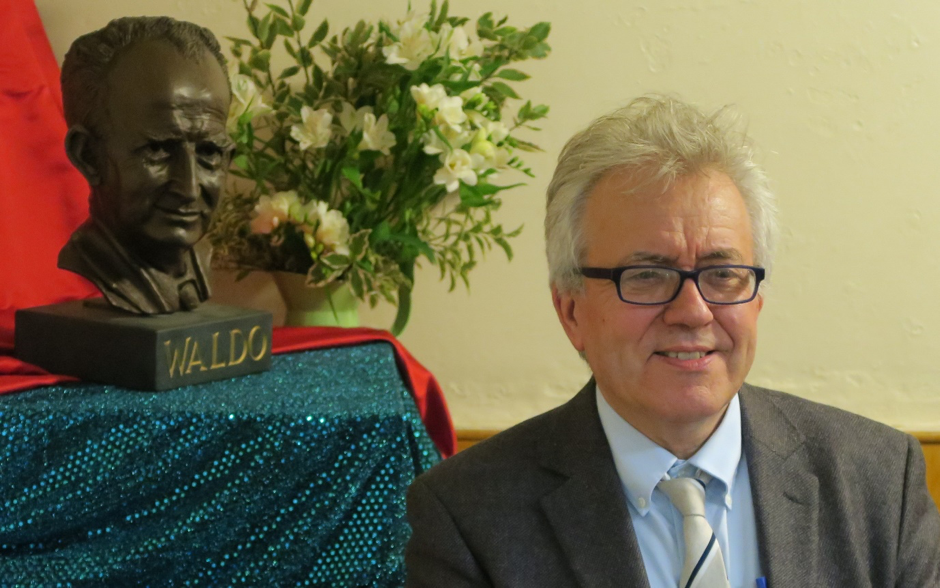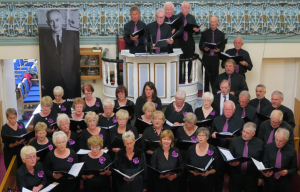
Re-building the House
Dr Robert Rhys based his lecture at Capel Hermon, Fishguard, on September 29 2017, to a large extent, on the majestic ode of praise delivered by Waldo on the occasion of honouring D. J. Williams by Plaid Cymru in the same town in 1964.
Waldo and D.J. were the best of friends despite the almost twenty years age gap between them. D. J. spent the greater part of his working life as a teacher at Fishguard High School though not from choice. He often applied for the headships of other high schools, including Llandeilo in his native Towy Valley, but was always unsuccessful according to the lecturer.
In his youth he had set his sights on emigrating to America to become a ‘rancher’. In order to earn sufficient money for the venture he spent a spell working underground as a collier in the Rhondda Valley. But he eventually turned his sights towards the university at Aberystwyth and went on to Jesus College, Oxford, without excelling as such. Following a short stay as a teacher in Monmouthshire he was appointed to teach English and Physical Education at Fishguard in 1919.
Waldo would regularly visit D.J. and his wife, Sian, at their home in town as he often lodged at Goodwick and Strumble Head with his sisters and close friends. Both supported the ILP in its early days and campaigned energetically during Willie Jenkins’ election campaigns. But gradually both turned towards Plaid Cymru.
Robert Rhys insisted D.J. had been a huge influence on Waldo’s early poetry and kindled his interest in Irish politics. D.J. translated a few books published by the Irish author A.E. (George William Russell) into Welsh and his influence as a poet can be clearly seen in the poem ‘Cofio’ (Remembrance) and even in the last line of the magnificent poem ‘Mewn Dau Gae’ (In Two Fields).
The lecturer explained how the cultured community described by D.J. in his series of short stories, ‘Storïau’r Tir Glas’ (1936) a ‘Storïau’r Tir Coch’ (1942), influenced the structure of the poem ‘Preseli’ written in 1947.
“Both believed there was a peaceful prehistoric existence and Waldo was of the opinion that the remnants of the golden age of civilization, when a better world existed, had survived within rural communities here and there in the Preseli,” he said.
He then referred to the volume ‘Storïau’r Tir Du’ (1949) explaining that the ‘black earth’ is the habitat of all prophets as they live within a society that does not share their ideals. D.J. was frustrated on seeing the demise of the Welsh language whilst imperialism and colonial mindset did not retreat fast enough for his liking.
In a letter to the press at the time of the Penyberth incident in 1936, when D.J. was jailed for nine months for his part in burning the bombing school, he described the town councillors of Fishguard as ‘aliens of our own blood’ because they condemned the symbolic political act.
To Waldo the ‘black earth’ was the old language bereft of her joy. The same sentiments are to be heard in such poems as ‘Fel Hyn y Bu’ and ‘Ar Weun Cas-mael’ where the ideal society which Waldo yearned for does not exist.
Robert Rhys thus explained the ode of praise contained many lines with an eerie depth of meaning such as ‘deifio’r llaw er adfer llys/rhoi ei aradr i’r erwau/llywio’n hyf a llawenhau’ (that can hardly be translated). And that explained the significance of the lecture title, ‘Ail-godi’r tŷ: cyfeillach D.J. a Waldo’. (Re-build the house: Waldo and D.J.’s friendship’) Both were keen to re-build the house on the pattern of their ideal of a cultured Wales.
The evening opened with Côr Abergwaun’s rendition of Waldo’s peace poem ‘Y Tangnefeddwyr’. Cymdeithas Waldo chairman, Eirian Wyn Lewis, hosted the event.

